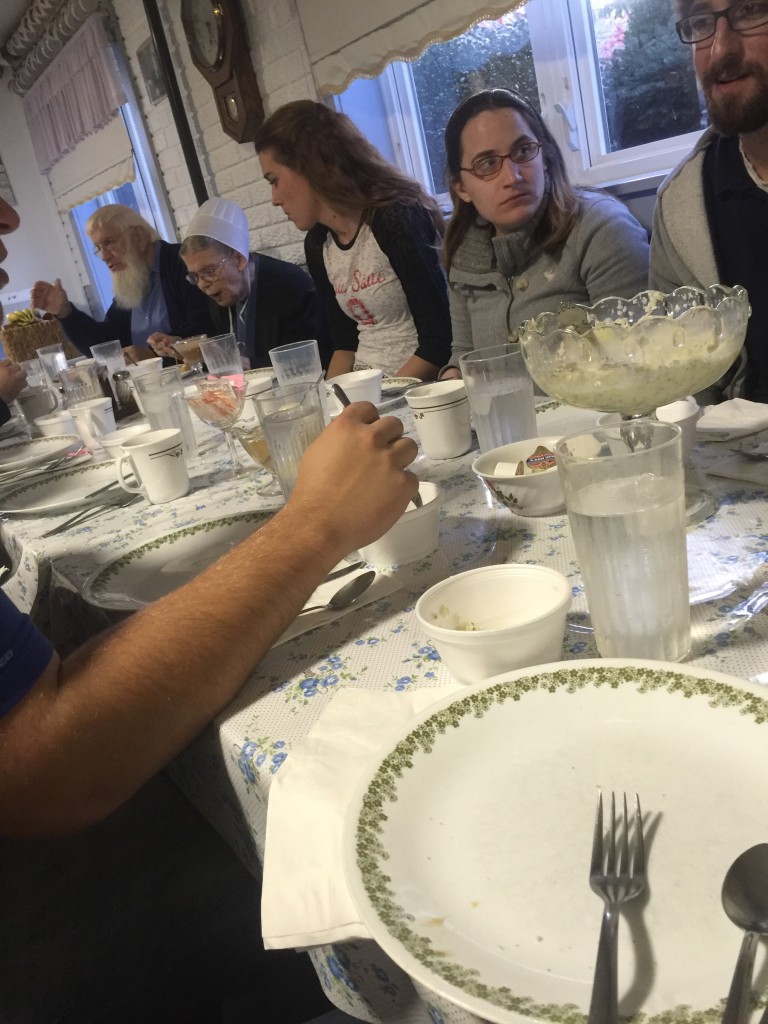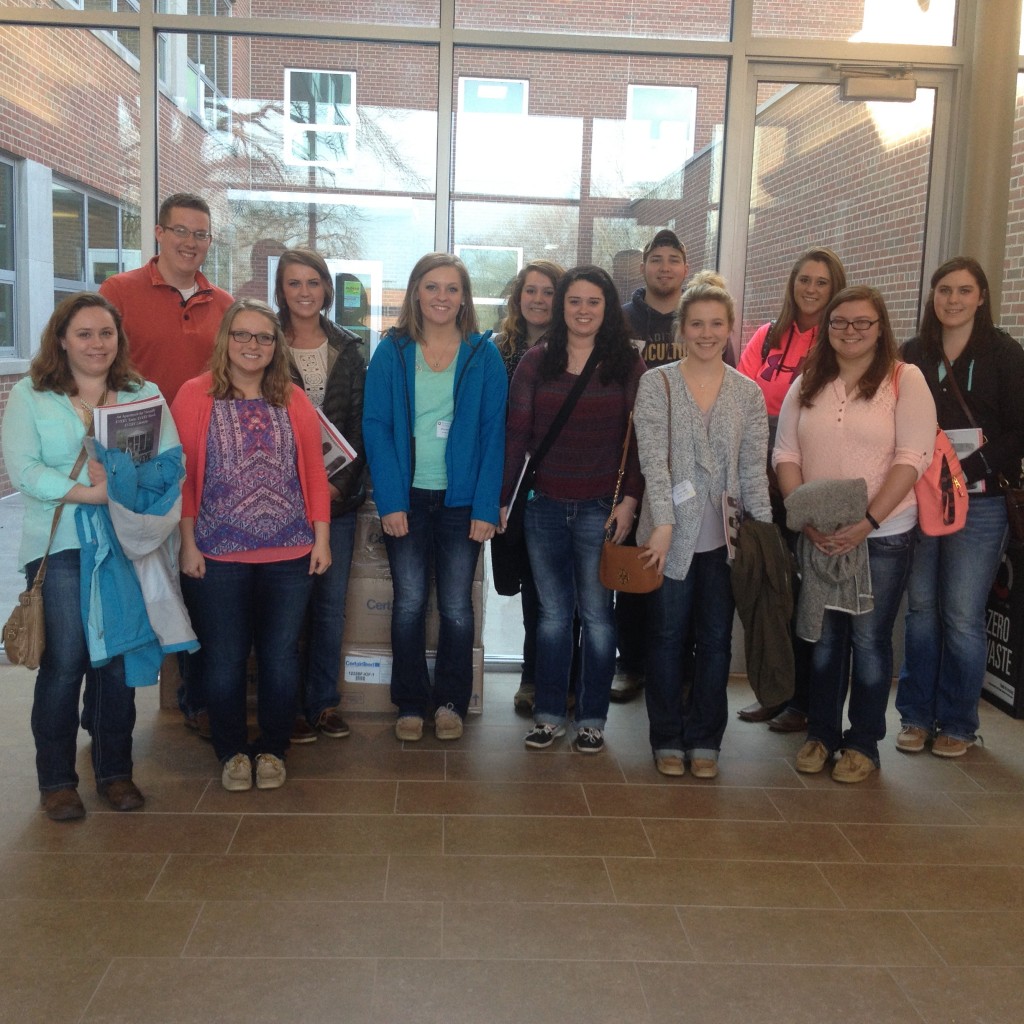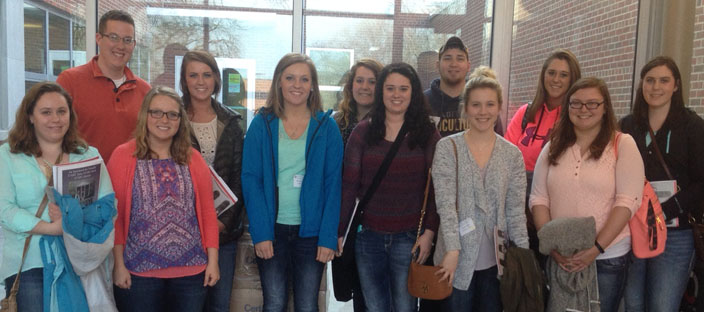ATI
ACEL alum named director of Ohio State ATI
Dr. Kristina Boone has been named the new director for Ohio State ATI. Boone completed her masters and doctoral degrees in the Department of Agricultural Communication, Education, and Leadership, graduating in 1991 and 1994 respectively.
Dr. Lonnie King, interim VP for Agricultural Administration and Dean for the College of Food, Agricultural, and Environmental Sciences, released the following statement this morning about Dr. Boone’s appointment.
I am pleased to announce Kristina M. Boone, PhD, has accepted the director position at Ohio State ATI effective April 1, 2017.
Most recently, Dr. Boone was a professor and department head in the College of Agriculture at Kansas State University. Her department supported academic programs at the bachelor’s and master’s level in Agricultural Education and Agricultural Communication. The department also directed the communications on behalf of the College of Agriculture, Extension, and Agricultural Experiment Station. She also was the director of the interdisciplinary secondary major in Global Food Systems Leadership, and as part of a team, developed an interdisciplinary doctoral program in Leadership Communication.
Prior to her 21-year career in Communications and Agricultural Education, Dr. Boone was a watershed extension agent with Ohio State University Extension and co-led a water education program at Ohio State during her graduate program.
Dr. Boone received her bachelor’s degree in agricultural communication at Texas Tech. Her master’s and Ph.D. are from The Ohio State University in agricultural communication and extension education, respectively.
As Ohio State ATI Director, Dr. Boone is responsible for managing the administrative, human, and financial resources for Ohio State ATI. She will provide leadership for all programmatic and administrative functions including on campus and emerging e-Learning instruction, research, service, engagement and marketing, and student services and recruitment.
Ohio State ATI, located in Wooster, is an associate degree-granting institute within CFAES where students participate in a curriculum that includes general and basic studies, experiential learning, and a paid industry internship. Ohio State ATI is the largest institution of its kind in the country, offering 26 programs of study.
I also want to extend my appreciation to Thom Janini, PhD, for serving as interim director. Thom’s leadership in this interim appointment provided continued support for the faculty, staff and students at Ohio State ATI.
Look for opportunities in April to welcome Dr. Kristina Boone to CFAES and Ohio State ATI.
Sincerely,
Dr. Lonnie J. King
Interim VP for Agricultural Administration & Dean
140 Agricultural Administration
2120 Fyffe Rd., Columbus, OH 43210
Phone: (614) 292-3676 – Fax: (614) 292-0452
Congratulations Dr. Boone! We look forward to having you return to the College of Food, Agricultural, and Environmental Sciences!
Not Your Average College Student
By: Katherine Bell
Liberty Center, OH
Agriscience Education
Sophomore
Being a college student is hard when you add up classes, job searching, gaining experience (such as internships, life experience, and job shadowing), pressure from parents/peers and financial issues. It can be stressful. When all that stress is adding up, who do you turn to; your parents, friends or maybe a teacher? Some won’t have these options available, for those students (living in residence halls or campus apartments) there are their Resident Advisors (RA).
For some students, talking to their RA might be the only person available. When the roles are reversed, seeing a campus through an RAs eyes is much different. Being an RA is both a blessing and a curse. Helping students with anything they need and always being there for them is amazing. Knowing that you made a difference in a resident’s life means a lot and knowing you’re leaving a lasting impact on them can turn your whole day around; but, as to every positive, there has to be a negative. Being an RA means that you are on duty 24/7. If a resident has a problem, you are expected to be there for them and help them out with whatever they need. Let’s take a little deeper look into the life of an RA.
1. Friends. During your first year of college you make tons of new friends, and meet tons of new people. Most of these friends you make you don’t know very well until later in the year, or even your second year of school. This leaves many people questioning how much they can trust them. When you become an RA, you have the awkward moment of potentially having to tell one of your friends they are violating some of the university policies. This can cause TONS of tension between friend groups-you find out who your real friends are.
2. School. As some residents tend to forget, RAs are students just like them. We have the same stressful classes, tests, and professors. Although we are going through the same classes, we still have to be there for you whenever. When you’re on a round, and you find something that needs documented, it doesn’t matter if you have an exam the next morning, you have to deal with the situation in the moment.
3. The Process. Since I’m not a student on the Columbus campus, but the Wooster campus (Ohio State ATI) our process is a little different than Columbus’. First in December you apply, after this is done, you go in for an interview. If you make it past the interview process, you’re invited to attend the seven-week seminar program where you will learn a more basic idea of what it means to be an RA. After these seven agonizing weeks are over, you get the email. This email will state if you have received the job or not. Meaning that you can go through the interview and the seminars and still not receive the job. Our housing coordinator, Mick Steiner, wants to know he’s hiring people who are their true selves, and you learn a lot about who you are in those seven weeks. After all this you come back two weeks before school starts to finish training and get the campus ready for the incoming students.
If you’re still with me at this point, I want to take a moment to thank you. The majority of the time with reading articles or posts this long I get bored halfway through and start doing something else. I promise I’m almost done. As agonizing as all of this may sound, I am so beyond blessed to have received the job as an RA at Ohio State ATI. The friendships I have made, the memories I have already, and the knowledge I have received through this job is astounding. I have learned more about myself and the world around me than I ever thought I would. If you even have a slight interest in becoming an RA, I encourage you to do it. I filled out the application with the attitude that I wasn’t even going to be in the running for a position, but I am so glad I did it, it changed me, and I hope it can change you too.
Finding Unique Leadership in Millersburg
By: Brianna Gwirtz
Shelby, Ohio
Agricultural Communications and Animal Sciences
Sophomore
What is one of the coolest parts about attending Ohio State ATI in Wooster? Being so close to a unique agricultural culture that many of us are familiar with: the Amish. It is no big deal to go driving down the road and pass a horse and buggy while attending ATI. Wooster is very near the heart of Amish country and there are approximately 36,000 members of the Amish community located within a five county area, including Wayne and Holmes county. I am in the Foundations of Personal and Professional Leadership class here at ATI, which happens to meet for lecture between 5:20-6:40… right during supper time. With some swift convincing, my class convinced our professor, Dr. Nathan Crook, to take us on a field trip featuring Amish cuisine. In order to learn more about leadership, to keep with the class’ curriculum, I contacted and coordinated the guest speaker, former Amish bishop Jacob Beachy and his wife, Irma.
We started our night at Raber’s Home Cooking in Millersburg, where Maudey Raber and her husband and daughters served us a delicious family style meal. The meal consisted of friend chicken, ham, mashed potatoes, green beans, cole slaw, homemade bread, noodles and of course home made pies! After the meal, Mr. Beachy spoke to us about leadership within the Amish community. He explained what he thought was the best traits as a leader: gaining trust from your followers, always being there when someone needs you, and not being afraid to stick your neck out. He explained a variety of topics, such as how women can perform leadership roles, why Amish choose to live a simple life, and the different rankings of leaders within the Amish faith. Overall, it was a great evening of food, fellowship and getting to experience a new culture.
Regional Campus Transition Day – Photos
On Wednesday, March 25, 2015, students from Ohio State’s regional campuses and ATI visited Columbus as part of Regional Campus Transition Day. This event is organized by the College of Food, Agricultural, and Environmental Sciences.
Our department had two students, Scott McDermott and Mary Siekman, serve on the student panel for all visiting students.
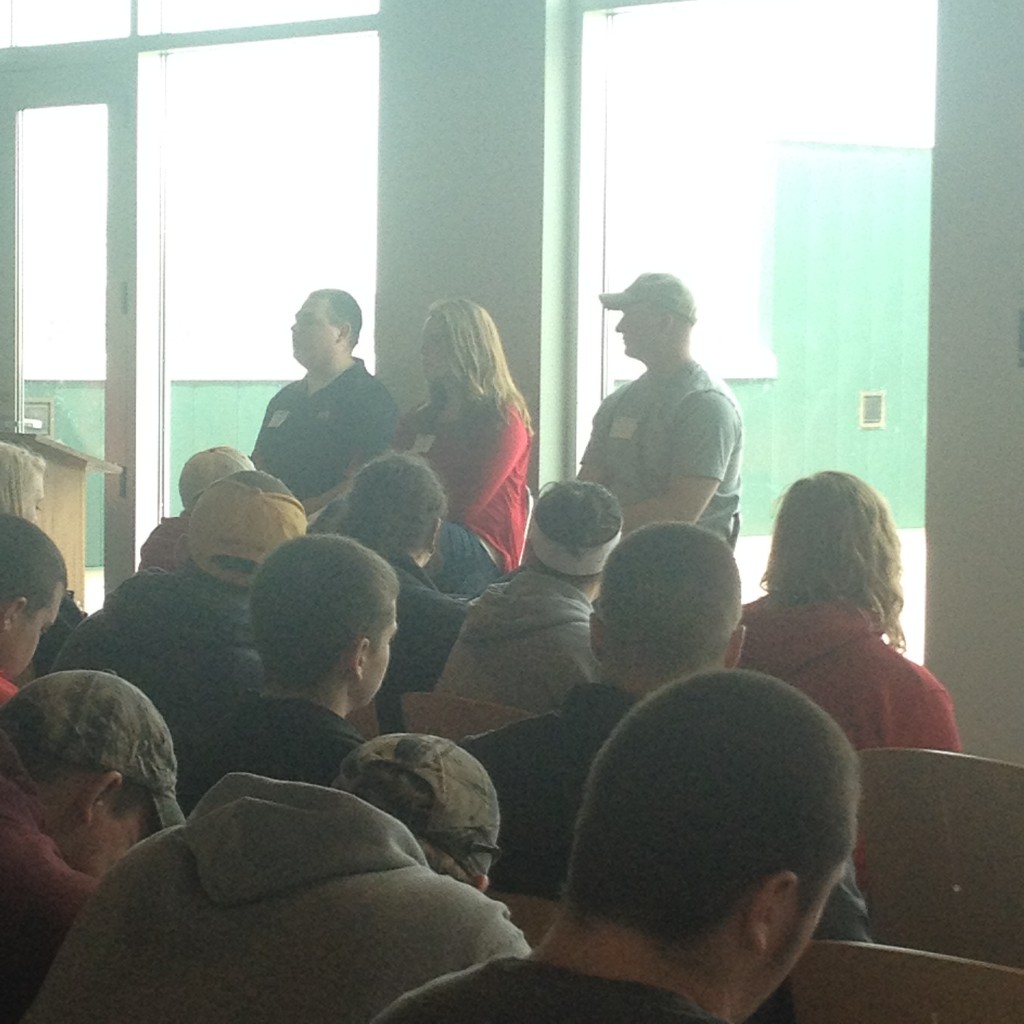
Scott McDermott (left) and Mary Siekman (middle) answer questions about student life at Ohio State to all transitioning students.
In the afternoon, students were separated into smaller groups based on their major. During our time with these students, five current students who have made the transition in the past talked to them about their likes and dislikes of Columbus. Students were able to ask questions and have current students answer honestly. Questions about student life, Greek life, housing, meal plans, and courses were asked. After the panel, students were met with their future academic advisors to ask specific questions about scheduling and major courses.

Regional campus students listen to the student panel.
After the Department Meetings, students were given a sweet treat before leaving campus and heading home to their respective campuses.
For additional information on transitioning from a regional campus or ATI to the Columbus campus, please contact Emily Wickham at wickham.24@osu.edu.
ACEL Students Participate in Transition Day
The Department of Agricultural Communication, Education, and Leadership hosted twelve students from Ohio State’s regional campuses and ATI on Wednesday, March 25 as part of Regional Campus Transition Day.
The event is hosted by the College of Food, Agricultural, and Environmental Sciences as an opportunity for students studying at regional campuses and ATI to visit the Columbus campus before their transition. Students were able to tour the CFAES campus, central campus, enjoy lunch at the Ohio Union, visit Ohio Stadium, and meet with faculty and staff in their departments. The day was concluded with an ice ceram reception.
During the time with our department, students met Dr. Gary Straquadine, Dr. Susie Whittington, Dr. Emily Buck, Dr. Annie Specht, Dr. Caryn Filson and Emily Wickham. Current undergraduate students who had transitioned from a regional campus or ATI served on an informal panel answering questions from a variety of topics on meal plans, housing, credit transfer, major courses, university size and student life. Ericka Priest (agriscience education), Ashley Rose (community leadership), Ashley Cromer (agriscience education), Justin Bower (agriscience education), and Justin Feltz (agriscience education) served on the student panel.
Students who begin their college education with Ohio State at a regional campus are eligible to transition to the Columbus campus after completing 30 credit hours. Regional campuses serve as a gateway to more than 170 majors at Ohio State, including the three majors in our department. For additional information on transitioning from a regional campus or ATI to the Columbus campus, please contact Emily Wickham at wickham.24@osu.edu.
Abbey’s Transition Experience
By: Abbey VanTyne
Waterville, Ohio
Agriscience Education/Animal Sciences
Junior
Hello, I am Abbey VanTyne and I am a transition student from Ohio State’s Wooster Campus, the Agricultural Technical Institute.
My experience in being a transitioning student has been, let’s say , very interesting thus far. For those of you that don’t know, ATI is a very rural area where you will definitely see an amish buggy more than once in your visit. I have been in Columbus for about two weeks now and have already had several “city experiences” that would never be experienced in Wooster.
For example, while walking to the Kroger on High Street, I actually had to WAIT for a crosswalk signal to go off so that I could cross the street. In Wooster (or any other rural areas for that matter), there aren’t even any buttons to push when you want to cross the street, you just go whenever you want! 
Another thing that has happened to me since transitioning is receiving a parking ticket. In Wooster, we could drive to the Shreve Swamps and park our cars wherever we wanted! Apparently the city is super strict on where you park your car, whether you saw the designated parking signs or not. Luckily, it was only a $45 ticket and nothing too outrageous!
These are the only city run-ins that I have had since moving to Columbus. Overall, the transition really isn’t too difficult.
Is Columbus completely different from Wooster? Yes. But is the transition unbearable? Absolutely not.
I have met so many new people already and can’t wait to meet even more with the start of the semester.
Bring it on, Columbus!
Thank you Abbey for sharing your transition experience with us!
This post originally appeared on the CFAES Student Blog. Please check out their posts by other students from all areas of the College of Food, Agricultural, and Environmental Sciences.
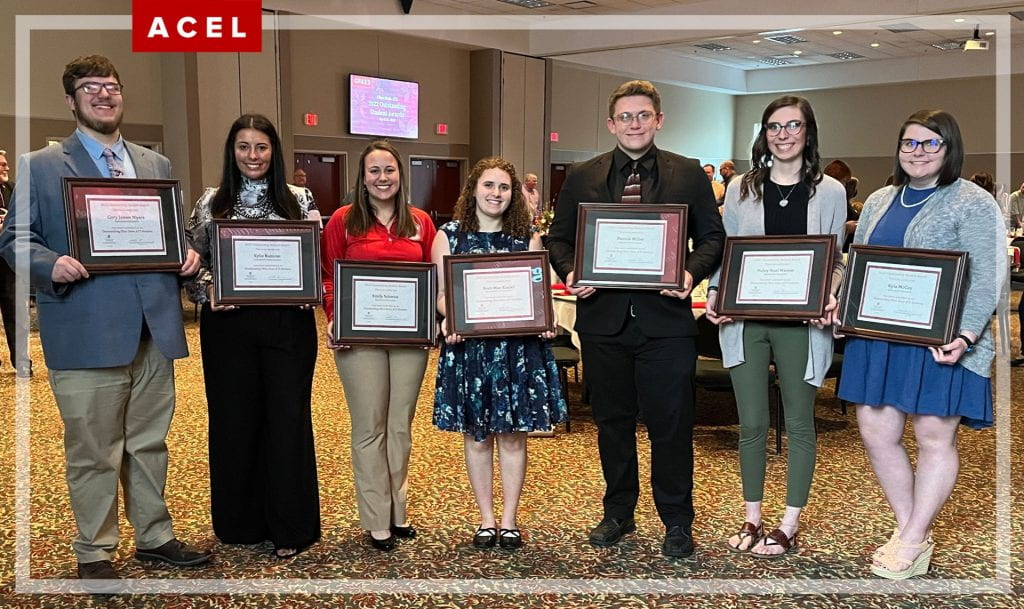




![image[1]](https://u.osu.edu/acel/files/2015/11/image1-1pn9dqm.jpeg)
![image[3]](https://u.osu.edu/acel/files/2015/11/image3-sh6dbe-e1446478349394-768x1024.jpeg)
![image[2]](https://u.osu.edu/acel/files/2015/11/image2-22gatyt-e1446478376761.jpeg)
